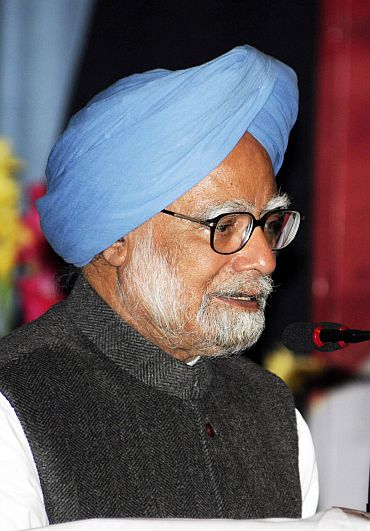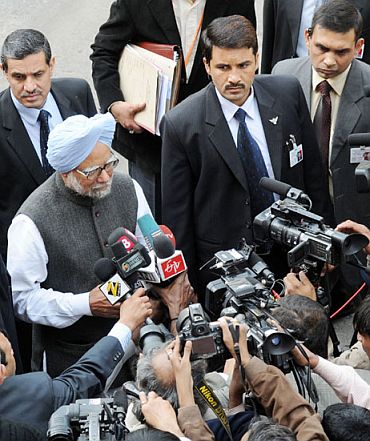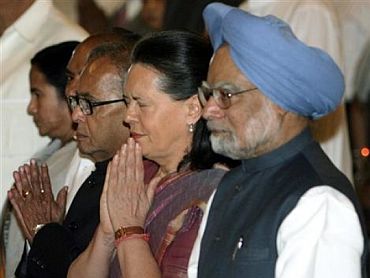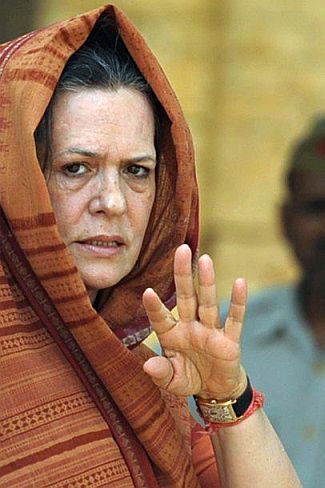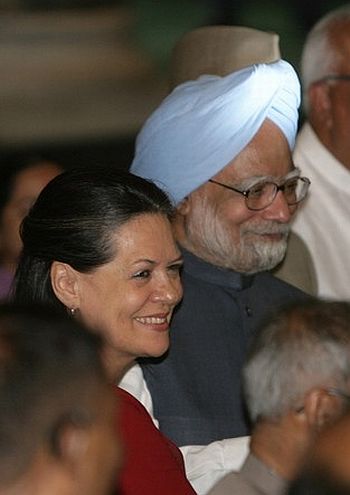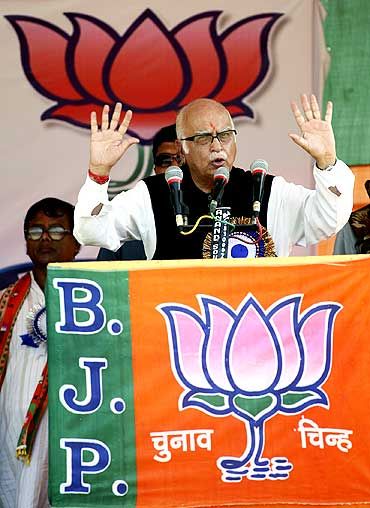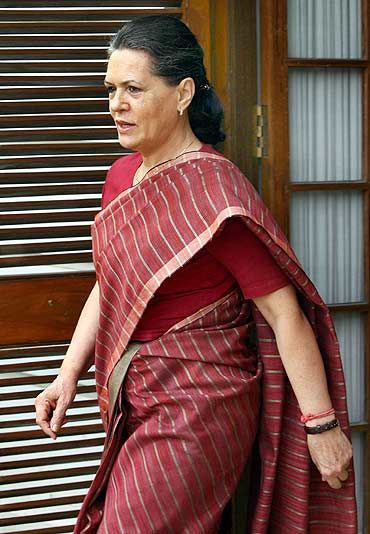 | « Back to article | Print this article |
'2G: The PM did not present a plausible defence'
Dr Mehta, who graduated from Oxford and got his Ph D from Princeton university, presents complicated Indian events with a clarity that helps us understand the chaos that is India. He is also a participant in the Global Faculty Programme at the New York University Law School.
His scholarly views are backed by a moral force and his thorough understanding of what could and couldn't work for India. Dr Mehta has been a member of many government panels and has helped inject sense in many public debates and discourses through his essays and columns.
Recently, he resigned as the member-convener of the prime minister's National Knowledge Commission, following a disagreement over the higher education policy. He was also a member of the Supreme Court-appointed committee on regulating Indian universities.
Dr Mehta has written many books that include The Burden of Democracy and an edited volume India's Public Institutions. His forthcoming work includes a book Constitutionalism in Modern India and a book on India's transformation. He is also co-editor, with Niraja Jayal, of the Oxford Companion to Politics in India. When in doubt about India you can, very well, seek an appointment with Dr Mehta.
Rediff.com's Sheela Bhatt had an enlightening meeting with Dr Mehta at his office at the Centre for Policy Research in Chankyapuri, New Delhi. He spoke with great insight about the 2G spectrum scandal that has besieged Prime Minister Manmohan Singh and his government, Congress President Sonia Gandhi, Congress General Secretary Rahul Gandhi and other issues.
Please click on NEXT to read the interview...
'The government seems to be complicit through sins of omission'
This question can be responded to in three ways. At one level nobody doubts the prime minister's financial integrity. Nobody is saying that the prime minister made money.
Two, some aspect of his image has certainly taken the taint. Certainly, the government seems to be complicit through the sins of omission in this process.
And the fact that as prime minister of this country he took so much public pressure, so much intervention, by all kinds of institutions including the Supreme Court, to even begin to respond has taken a little bit of sheen off him.
Second, the thing that was a bit confusing about this press conference and that adds to his diminishing stature is that somebody as thoughtful and as articulate as he is in terms of understanding the policy process has not produced a convincing defence of what (the Prime Minister Office's stand over the 2G spectrum allotment policy that eventually led to the loss of billions of rupees to the exchequer) the narrative of events was and why particular policy choices were made.
To me what was interesting is that there is actually a plausible defence of the policy framework which the government adopted (regarding allotment of 2G spectrum). It didn't go for auction. It is not so that auctioning is always good, right?
What is surprising is that the government has not put forth that convincing defence.
If I would have been in the prime minister's position, I would say, 'Look, the reasons I didn't go for an auction was, partly, because some people said an auction would have benefited incumbents and we wanted to open up the industry.'
The second reason, the reason that the National Democratic Alliance used to give, which is the fact that people got low calling rates.
This fact the prime minister has not been able to articulately defend, I think, leads to the impression that they (the PMO) have not been clear about what the story was, why certain decisions were taken.
The general intellectual confusion, where the PM should have been strongest, is just adding to the sense that they have something to hide.
'There are too many internal ideological divisions within the government'
I don't think it's so much about lack of ideology.
At one level, for any government in India at the moment, the core ideological issue as far as governance is concerned is very straightforward -- which is how do you produce growth of 9 to 10 percent and then use the proceeds of that growth to create a more inclusive society?
That has been the social context. This is not very complicated. In some sense that is what the UPA was trying to project itself.
I think, unfortunately for the UPA government there are too many internal ideological divisions within the government for them to be able to tell this large story very clearly.
The one sticking point in telling the story, the point through which all our conversations pass through, is the point about governance.
You have created these large social sector schemes. You are creating legislation granting your citizens one right after the other.
The trouble with that architecture is that most of that is devoted towards solving yesterday's problems. It's not facing up to tomorrow's challenges.
Also, you are not able to convincingly defend those programmes because there are serious governance challenges. What exacerbates that governance challenge is the fact that you don't have intellectual clarity within the (Congress) party about where do you want to head?
We were talking of the tension between the party and the government.
Now you have the National Advisory Council on one track and the finance ministry on another track; the planning commission is on a different route and the Prime Minister's Office is on another track.
At some point someone should come down and say 'Look, for 60 years we have been discussing these issues. Now, let's have some clarity and move on.'
That authority, nobody seems to be exercising in this government.
'What is the story the Congress party wants to tell?'
We expected he would provide better governance, at last, which is the most important issue that can tackle even poverty in India.
In retrospect, don't you think the prime minister has performed the least on this front?
To me the core issue is: The prime minister governs at the behest of the political party and leadership of that party. That has been clear right from the start. Often, they had a fruitful and constructive relationship.
The big puzzle right now is not if the prime minister is active or not. The big question is: What is the story the Congress party wants to tell? After all, this is a parliamentary democracy in which the party matters.
Other than general platitudes what do the party's key political leadership think about corruption and other issues? We have had one national crisis after another. We had Kashmir, corruption, Telangana... Who is exercising the leadership in the party on these issues?
The prime minister's hand is strengthened when the unified party is behind it. He does not seem to be getting that. What does Sonia Gandhi think about these issues? What does Rahul Gandhi think about it?
To me, the issue is the big intellectual and ideological vacuum at the level of the Congress party, and the PM's problem partly flows from that.
The very basis (Sonia GandhiM) of your power is not sure about where it wants to go, then it will get reflected in your confusion.
I think another thing the prime minister could have done is that in a modern democracy no prime minister can choose to remain silent for so long on so many critical national issues.
There is a pattern to it. When the Kashmir crisis was blowing up, it was months later that you got the statement.
Inflation is the core issue on which the PM has some authority on, right? He gave a very, very late and very abstract statement.
In the last (monsoon) session of Parliament the only statement he made was on the civil nuclear deal. To me the puzzle is that it is actually self-defeating for him.
If the prime minister speaks on issues, then a lot of criticism would be defused.
People have started feeling that you are not speaking because you must be having something to hide or you are not clear about it in your mind.
(This interview was conducted before Dr Singh spoke in Parliament on February 24.)
'It's dangerous to think that someone who is not a politician can fix the system'
Let us be clear about this. He is a politician. There is no other way to describe him. You will not do well in the upper echelons of power unless you are a politician.
He is not a conventional mass politician, but he is a politician. Okay?
Let us also be very clear that in a democracy there is no way of bypassing politics.
I think it is dangerous to think that someone who is not a politician can fix the system. We are a democracy and politicians matter and it should matter.
I don't think the issue is why he failed despite being a bureaucrat once. You don't want the IAS running the country. At the end of the day we want politicians to run this country.
The issue is, as I said, why has the Congress party not got its act together? If it had clarified issues and ideological confusion, it would strengthen the prime minister.
The crisis in Kashmir, Telangana, the 2G spectrum issue suggests one thing -- that the jugalbandi between Dr Singh and Sonia Gandhi is now giving diminishing returns. I am talking about the reality of the two centres of power in the UPA.
This confusion is not necessarily the outcome of 'two centres of power'. In fact, to be very honest, there are no two centres of power.
Politically, there is only one centre of power. That centre of power has to be very clear about what it wants. Sometimes, you can get a terrible outcome even if you have a single centre of power.
Let us not be nostalgic about the Indira Gandhi days. I don't think these formal features matter. On the reverse side you can take the Bharatiya Janata Party. It is astonishing that in spite of the government handing issue after issue on a platter it is not the party gaining huge momentum.
What is common to both is the lack of clarity about where they want to go and what is common to both is that there are certain thresholds of ethical conduct from which you should not fall below if you want to have credibility.
What is also common to both is that different people are speaking in different voices. You have a situation here where neither the ruling party nor the Opposition party is able to project credibility.
'Complacency is absolutely deadly in politics'
Complacency. I think what failed them is complacency. I think they just assumed that they were on a roll and the BJP was weakening and they could get on by doing nothing.
Complacency is absolutely deadly in politics.
I think the second thing that failed the government is that the party is not clear in its mind what key condition brought them to power.
I think the prime minister is clear in his mind, but not the party. Many people in the Congress party seem to believe that growth is not important to that victory.
Growth is actually important because growth created the enabling conditions for all these other things they did. But when you don't understand the grounds on which you are standing this kind of confusion arises.
Third, there is also a structural issue. Money matters. Campaign finance matters. You can't expect a corruption-free system until and unless this fundamental structural issue is corrected.
Telecom, infrastructure and land are big areas. The government didn't come with a clear, transparent, reformed-oriented regulatory regime in these areas.
Fourth, we know Rahul Gandhi is extremely important for the party. He is mobilising the new constituency for the party. Somehow, he seems to be operating on the assumption that there is a difference in political mobilisation and government and governance.
That assumption simply won't work beyond a point. Three years is a long time in politics. This government can still put its act together. But they have to overcome complacency.
'The RSS is a diminishing social force'
It looks that, for the moment, the worst is over for the BJP. Immediately after the elections it was going in different directions. But the BJP has huge challenges.
It has a hard time projecting that it is a credible national party. It has some good chief ministers. It is doing well in four states. It will find very hard to expand outside those four states.
The BJP is electorally competitive in no more than 215 to 220 Lok Sabha seats. In order to be a credible national force it has to peak in all those 220 seats, simultaneously.
The way our election cycle works, it is going to be very hard to do.
In Rajasthan, it might come back, but in Karnataka, it may lose some seats. In Madhya Pradesh it is doing reasonably well. But in having a pan-India presence it has a structural problem.
The RSS (Rashtriya Swayamsevak Sangh) is a diminishing social force in its core areas. The RSS's social network was in second-tier towns of India. Its average age is increasing. Fewer and fewer young people are joining it. It is simply not as powerful a cadre as it used to be.
The BJP is not yet clear about how to handle the RSS. In fact, to be honest, on the recent issue of 'Hindu terror,' the RSS has shown more maturity than the BJP has, at least, in public statements.
The BJP's own track record on corruption, which is evident in Karnataka, is before us. The chief minister may have stuck to power in Karnataka, but he has become a national liability for the BJP.
All of these reasons demonstrate that it is not certain the BJP is capable of capitalising from the government's crisis as much as you might expect.
Do you subscribe to the commonly debated theory that the BJP has to move towards a more centrist ideology to win more votes and become a true national party?
It has no option but to come to the centre. Maybe slightly right-of-centre. There is absolutely no question about it, simply because it won't get allies. (Bihar Chief Minister) Nitish Kumar is holding on to them because the BJP is self-restrained in Bihar.
Also, if you think about what is fertile ground for the extreme right in politics, you will agree that it arose when there was a great national anxiety. You can whip up national anxiety in only certain circumstances.
Despite these corruption scandals there isn't that great national anxiety. Even amongst sections of the right and amongst people who call the Congress pseudo-secularists there is substantial recoiling at the prospect of violence.
The BJP should have learnt from the 2009 election when it tried to politically capitalise from the 26/11 attacks in Mumbai in a wrong way. Most people find L K Advani's reactions to Malegaon much more passionate than his reactions post-26/11.
Varun Gandhi may have regained his seat, but it sent the wrong signals to a whole range of people.
There is no question that the BJP has to draw the Lakshman Rekha saying: We are a right-to-centrist party that can function in a liberal democracy and we won't give place to people who compromise fundamental Constitutional values.
'Indian politics is moving so fast that all things are going to turn on their heads'
It will depend on circumstances. One thing you have to say about the First Family. One acid test about them is that in personal terms they have conducted themselves rather intelligently and gracefully. That gives them substantial political capital.
They also have the advantage that the structure of the Congress party is such that almost all the other leaders cancel each other out.
What is true of both political parties is that there are no national level leaders left in the two parties who can say that I delivered five parliamentary seats.
They are lucky if they deliver of their own and some one or two more seats. The BJP does have regional level leaders, but their ability to move outside their state is still very limited, including Narendra Modi.
Usually it happens that powerful state leaders cancel each other's power out. Modi will be very upset if Shivraj Singh Chauhan became a national leader.
The BJP doesn't have a national leadership and it will be difficult for their state leaders to make the transition to a national level. The Congress is in a worse position because the Congress doesn't have too many powerful chief ministers.
They have no leaders right now who are not dependent on the blessings of the central leadership.
The very structure of the Congress party makes it very difficult to displace Sonia Gandhi. It is too premature to write her off.
People do see that so much corruption was allowed under her leadership.
It will depend on how they play it out. It is very possible that in six months we will be having a different conversation.
The government will stand up and say: We got rid of A Raja. We got rid of Ashok Chavan, we got rid of Suresh Kalmadi. We went after people like (alleged tax evader) Hasan Ali. We are questioning A whole range of corporates under the Supreme Court's supervision.
There is still potential that this narrative can change around. What would the BJP talk within six months if all these things are done? What will happen to the corruption story?
People would say 'Yeh to unki chal hai (it's just a political move of the government)'. (BJP leader) Arun Jaitley has said the government is doing things only after the Supreme Court's pressure.
After six months, the issue won't have that much urgency. Politics is not about whether somebody has a cause or not. Politics is about whether your opponent has more cause than you. The BJP is going to find it very hard to project a credible narrative.
Will the BJP stand up for the Bellary brothers? For B S Yeddyurappa? In the comparative game the BJP must criticise the government for moving so late and acting under pressure.
All I am saying is that Indian politics is moving so fast that all things are going to turn on their heads.
